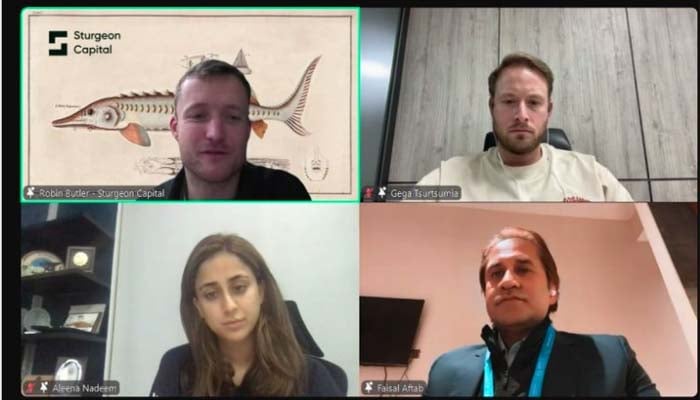
The startup ecosystem is a dynamic, fast-evolving domain requiring agility, innovation, and sharp strategic decision-making. Entrepreneurs worldwide face numerous challenges, including securing funding, determining valuations, and ensuring long-term sustainability. However, through collaboration, innovative funding models, and adopting global best practices, startups can seize opportunities and excel in an increasingly competitive market.
Paklaunch, an initiative dedicated to strengthening connections within the global tech startup ecosystem, launched the Venture Corridor webinar series in 2023. Its 10th edition, the “Georgia & Pakistan Venture Corridor” webinar, marked a significant milestone. The session underscored Paklaunch’s commitment to bridging gaps between emerging markets and fostering meaningful collaborations.
The latest webinar featured prominent founders, venture capitalists, and ecosystem builders, including Sturgeon Capital Partner Robin Butler, Zayn VC Founder and CEO Faisal Aftab, EduFi CEO Aleena Nadeem, and PAYZE Co-Founder and Co-CEO Gega Tsurtsumia. Discussions covered critical aspects of startup growth, such as valuation, international funding sources, and strategies for securing venture capital.
Venture debt in Pakistan and Georgia
One of the focal points of the discussion was the exposure of venture debt providers in Pakistan and Georgia. Venture debt is a vital funding source, particularly for mature markets, as it allows startups to raise capital without diluting equity. However, its adoption in both Pakistan and Georgia remains in its infancy.
Speakers highlighted that, while venture debt offers significant opportunities for growth, its limited uptake in these regions stems from several challenges, including the lack of awareness and underdeveloped financial ecosystems. Despite these obstacles, both countries are witnessing a growing interest in venture debt, reflecting the broader acceleration of their startup ecosystems.

The art of valuation
During the session, Gega Tsurtsumia and Aleena Nadeem provided insights into the intricacies of startup valuation, particularly during the seed stage. They described valuation as more of an art than a science, noting its highly subjective nature.
“Early-stage valuation is essentially about determining how much equity you are willing to give up in exchange for capital, which makes it somewhat arbitrary,” explained Gega.
For example, a seed round aiming to raise $1 million might see founders offering 10-20% equity, resulting in valuations between $5 and $10 million. However, the final valuation is often the outcome of negotiations between founders and investors, with factors such as market potential, traction, and team quality influencing the figure.
Development finance institutions vs private investment funds
A significant portion of the discussion centred on the contrasting roles of Development Finance Institutions (DFIs) and private investment funds in capital allocation. DFIs, such as the International Finance Corporation (IFC), the European Bank for Reconstruction and Development (EBRD), and the European Investment Bank (EIB), are instrumental in fostering economic growth in underserved sectors of emerging markets.
Private investment funds, including heavyweights like Tiger Global, Andreessen Horowitz (A16z), Accel, and Sequoia Capital, focus on high-growth, lucrative ventures with scalable business models and proven track records.
The panellists noted that DFIs have been pivotal in supporting early-stage startups in Pakistan and Georgia. However, as these ecosystems mature, global venture capital firms are showing greater interest, unlocking new funding opportunities and driving growth. This evolving dynamic represents a significant shift, providing startups with broader access to both capital and expertise.
Choosing the right jurisdiction for global funding
Another topic of interest during the webinar was selecting an appropriate jurisdiction for startups seeking international funding. Gega Tsurtsumia shared practical advice on choosing jurisdictions familiar to venture capital firms.
“Jurisdictions like Delaware, Singapore, and the Cayman Islands are popular choices for emerging-market ventures,” he noted, citing their favourable tax and legal frameworks.
For instance, Y Combinator (YC), a leading startup accelerator, requires its participants to establish holding companies in Delaware due to its business-friendly environment.
However, Gega cautioned against overlooking potential tax implications. “Delaware holding is a taxable entity,” he explained. Entrepreneurs should carefully consider their exit strategies, as the combined effective tax rate on capital gains and withholding taxes on distribution can reach 50%.
For startups in Asia, alternatives such as a 5G entity might offer greater flexibility and fewer tax complications, enabling founders to navigate global markets more effectively.
Navigating market volatility
Market volatility is an inevitable challenge for startups, separating resilient entrepreneurs from those unprepared for uncertainty. Panellists advised startups to remain diversified, maintain cash reserves, and prioritise solving real-world problems that add tangible value.
“Stay diversified, keep cash for opportunities, and back businesses solving real problems that add value to people and the planet,” was the advice shared by industry experts.
Despite the unpredictable nature of markets, businesses addressing genuine needs with innovative solutions are likely to thrive, even in challenging circumstances.
The “Georgia & Pakistan Venture Corridor” webinar offered invaluable lessons for tech startups in these emerging markets. From understanding venture debt and valuation dynamics to navigating global capital allocation and jurisdictional considerations, the session equipped participants with practical knowledge to drive growth.
Paklaunch’s efforts in connecting ecosystems like Pakistan and Georgia highlight the immense potential of cross-border collaboration. By focusing on innovation, strategic partnerships, and adapting to global best practices, startups in these markets are poised to compete on the global stage, redefining the future of entrepreneurship.
With sustained efforts, initiatives like Paklaunch will continue to empower entrepreneurs, fostering a resilient, dynamic startup ecosystem capable of overcoming challenges and unlocking new opportunities.
















